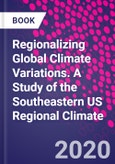Regionalizing Global Climate Variations: A Study of the Southeastern US Regional Climate provides a framework for understanding regional climate in light of the many assessment reports being released regularly by international organizations. The book emphasizes global climate variations to explore the concept of the regionalization of those variations. Focusing on the climate of the Southeastern United States as a lens, it provides a template for targeting regional climate change in the context of global variability. It includes coverage of weather extremes, such as tornadoes, cyclones, and drought, and approaches the subject from a holistic perspective, including atmospheric, oceanic, and land components.
The Southeastern United States is a particularly relevant case study, given the fact that it is the largest quarter of the United States and has the most coastlines, often resulting in a higher number of extreme weather events. This practical approach to understanding climate at the regional/local scale makes the book a valuable resource for students and researchers in Meteorology, Climate Science, Oceanography, Environmental Science, and other applied sectors.
Please Note: This is an On Demand product, delivery may take up to 11 working days after payment has been received.
Table of Contents
1. Regional climate in global context2. Land-atmosphere interactions3. The North Atlantic Subtropical High4. The Intra-Americas Seas5. Florida's climate6. Teleconnections7. The North Atlantic tropical cyclones8. Tornadoes9. Droughts and Floods10. Climate change







